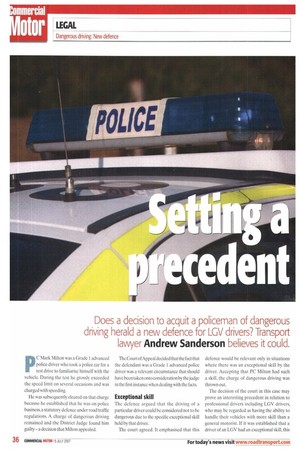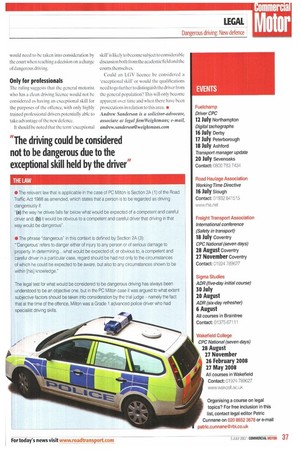Does a decision to acquit a policeman of dangerous driving herald a new defence for LGV drivers? Transport
Page 40

Page 41

If you've noticed an error in this article please click here to report it so we can fix it.
lamer Andrew Sanderson believes it could.
pC Mark Milton was a Grade 1 advanced police driver who took a police car for a test drive to familiarise himself with the vehicle. During the test he grossly exceeded the speed limit on several occasions and was charged with speeding.
He was subsequently cleared on that charge because he established that he was on police business, a statutory defence under road traffic regulations. A charge of dangerous driving remained and the District Judge found him guilty— a decision that Milton appealed. The Court of Appeal decided that the fact that the defendant was a Grade 1 advanced police driver was a relevant circumstance that should have been taken onto consideration by the judge in the first instance when dealing with the facts.
Exceptional skill The defence argued that the driving of a particular driver could be considered not to be dangerous due to the specific exceptional skill held by that driver.
The court agreed. It emphasised that this defence would be relevant only in situations where there was an exceptional skill by the driver. Accepting that PC Milton had such a skill, the charge of dangerous driving was thrown out.
The decision of the court in this case may prove an interesting precedent in relation to professional drivers including LGV drivers, who may be regarded as having the ability to handle their vehicles with more skill than a general motorist. If it was established that a driver of an LGV had an exceptional skill, this
would need to be taken into consideration by the court when reaching a decision on a charge of dangerous driving.
Only for professionals The ruling suggests that the general motorist who has a clean driving licence would not be considered as having an exceptional skill for the purposes of the offence, with only highly trained professional drivers potentially able to take advantage of the new defence.
It should be noted that the term 'exceptional skill' is likely to become subject to considerable discussion both from the academic field and the courts themselves.
Could an LGV licence be considered a 'exceptional skill' or would the qualifications need logo further to distinguish the driver from the general population? This will only become apparent over time and when there have been prosecutions in relation to this area. • Andrew Sanderson is a solicitor-advocate, associate at legal firmWeightmans; andrew. sanderson@weigh Imans.co






























































































































































































